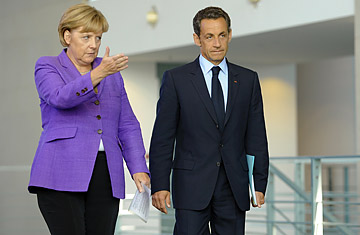
German Chancellor Angela Merkel (left) and French President Nicolas Sarkozy arrive for a joint press conference in Berlin on August 31, 2009.
(2 of 2)
It may help that Merkel's hands are likely to be less tied in a coalition with the economically liberal Free Democrats than they were with the Social Democrats — a change that could push Germany closer to the French line on nuclear power and relations with Russia. But what isn't yet known is how warmly the Free Democrats will embrace closer cooperation with France. They won 14.6% of the vote, a record result for the party, and their leader, Guido Westerwelle, is likely to become the next Foreign Minister. His campaign focused on how to revive Germany's economy, and he was vague about broader European issues. In an interview with TIME before the election, Westerwelle didn't refer directly to France but talked about the critical importance of the E.U. as a political entity, not just an economic one. "If Europe hadn't achieved anything other than peace for this [postwar] period, it would already have been worthwhile," he said. But the E.U. could do more to improve its decision-making structure, he added: "Europe needs to be better. It should focus more on issues that have to be discussed at a European level and should hold back from questions that countries can decide."
On matters of business and finance, Westerwelle is far from sharing France's passion for government meddling. Indeed, his calls for German tax cuts and fiscal restraint to bring down the budget deficit is diametrically opposed to Sarkozy's plans to spend his way out of the crisis with a new gigantic government-bond issue. Still, when it comes to Germany's relationship with France, Joannin of the Robert Schumann Foundation points out that the Chancellery rather than the Foreign Ministry usually calls the shots.
In the business community there is clear support for a closer relationship. Claude Bébéar, who heads the Institut Montaigne, is a former CEO of insurance giant Axa and a formidable corporate power broker. At a recent panel discussion in Paris, Léo Apotheker, the CEO of German software firm SAP, endorsed many of the institute's ideas and lamented that the recent financial crisis "showed the nonexistence of Europe." He also advocated merging the French employers' association Medef with its German counterpart, the Federation of German Industries.
The last time there was a push for deeper integration, it came from the German side, in the form of a 1994 paper authored by Wolfgang Schäuble, a close confidant of then Chancellor Kohl, and Karl Lamers, then foreign-affairs spokesman for Merkel's Christian Democratic Union. They outlined a new "core" Europe in which France and Germany would make up the inner "core of the core." The French never formally replied to that proposal. That was "a mistake," says Jean-Pierre Jouyet, the former French Minister for European Affairs who now heads the national stock-market regulatory agency.
Now France is pushing closer ties and Lamers, since retired, believes both countries have finally gotten the message. "Sarkozy has learned and realized that he, too, has made mistakes in the past," he says, citing the French President's initiative for a Mediterranean Union which caused irritation in Berlin in 2007. "There's an understanding on both sides now that the countries need each other."
With reporting by Henning Hoff and Catherine Mayer / Berlin
